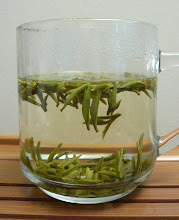Between Green and Red (1) is here.
In my eyes, Fo Shou is a very intriguing varietal. In Southern Fujian, this tea varietal is called Fo Shou (Buddha Hands), named after a fruit (Asian Bergamot, which has fruit like a slightly closed hand of the Buddha's). In Northern Fujian (Wu Yi), this same tea varietal is called either Fo Shou, or Xue Li (Snow Pear), or Jin Fo (Golden Buddha). I love every of its names!
Here are two Yong Chun Fo Shou products, one is light oxidized without much roasting and the other is medium oxidized with light to medium roasting.
The "greener" style Fo Shou. It's not as tightly curled as Tie Guan Yin, and doesn't usually yield as many infusions as Tie Guan Yin. But it has very unique flavor that reminds you of greener fruits.
Fo Shou with slight charcoal roast. The roast is not very deep and dry leaf color is mainly from medium oxidation, not from roasting.
The liquor is light golden color. It's still of brighter flavor than most roasted oolong. The leaf materials are not suitable for heavier roasting and therefore this tea was made with light roasting.
Yong Chun Fo Shou used to be much more popular than it is nowadays. It was one of the most exported teas in the old days in Fujian. And it was one of the favorite oolongs among Southeastern Asian Chinese. But It was not easy for me to find some good Yong Chun Fo Shou. And I have yet to find a darker roasted Yong Chun Fo Shou that has more complex taste than fire flavor.
Wu Yi Fo Shou, although a small varietal among numerous Wu Yi teas, has been well existing through all these years. Here is a Wu Yi Fo Shou that I've luckily obtained from an artisan tea worker and Wu Yi tea scholar.
___________________________________________________
Many years ago, in 1980s, there were more and more of these tasty Fujian citrus/oranges in my hometown in North China. They were sweet and juicy, a great treat in winter days. They were big and shiny, individually wrapped with tissue paper. We all loved them and they were people's favorite gifts. A lot of these oranges were from Yong Chun, hometown of Yong Chun Fo Shou Oolong. Many years later, a Fujian friend told me, his family used to own a lot of orange trees in Yong Chun. In 1980s, oranges were sold so well that many farmers chopped down their tea trees and converted their tea plantations to orange orchards. But several years later, there started to be so many oranges in the market and prices of oranges dropped a lot. Tea farmers became orange farmers, but their oranges didn't bring in as big a fortune as they had expected. Several more years later, there started to be a pathogen infecting a lot of orange trees in Yong Chun, and many farmers lost all their orange trees. In recent years, more and more farmers chopped down their orange trees and re-started Fo Shou tea plantations.
When I read about Taiwan tea, I've learned that similar story happened in Taiwan too. In 1960s, when bananas were sold well in export trades, many tea farmers chopped down their tea trees to make space for banana trees. Then, banana prices dropped rapidly, leaving lots of farmers in desperation. Later, many farmers put themselves together and re-started their tea plantations. And this time many of them made a fortune. The following decades became the best era of Taiwan tea.
My Fujian friend says, nowadays Yong Chun oranges are not that abundant, and he really misses those oranges. Me too! We both wonder, can't we have both the nice tea and tasty orange from Yong Chun? Why would everybody want to grow the same thing as everybody else? But to us, the "city dwellers", it's just "I love the oranges!" or "I love the tea!". To the farmers, what they grow connects to everything in their lives, hope, struggles, disappointment, desperation, and new hope. We can hardly say what the farmers "should" grow. More often than not, the farmers know better than we do, and they just need to make a living. It seems we are now in a great era of tea. When tea cultivation is rewarding to tea farmers, we, as tea drinkers will have our luck to get a lot of great tea.


































4 comments:
I always learn something new when I read your posts Gingko! I like how you add little stories to your informative articles.
I agree; oranges & tea that would be nice. We'll just have to keep on drinking plenty of tea, so growers don't abandon those nice tea gardens again.
Great blog. More people should read you!
J.
I have to agree with Jackie. I loved the post Gingko
Nostalgia vs. Reality. Many of us forget that life is about survival. We get a bit of money and we stop thinking about survival and want to have fun. Those farmers work their butts off to give us some fun. Not much security in their profession.
Keep up the good writing, Gingko!
Thanks guys! I've been struggling a lot in English writing and encouragement from you guys means a lot to me!
Post a Comment